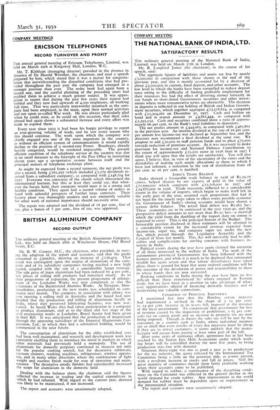COMPANY MEETING
THE NATIONAL BANK OF INDIA, LTD.
SATISFACTORY RESULTS
THE ordinary general meeting of the National Bank of India, Limited, was held on March 27th in London.
Mr. R. Langford James (the chairman), in the course of his speech, said: The aggregate figures of liabilities and assets are less by nearly £3,000,000 in comparison with those shown at the end of the previous year, and this is mainly accounted for by a decrease of about £2,5oo,000 in current, fixed deposit, and other accounts. The low level to which the banks have been compelled to reduce deposit rates owing to the difficulty of finding profitable employment for their resources has had the effect of diverting money formerly in our hands to short-dated Government securities and other invest- ments where more remunerative terms are obtainable. The decrease in deposits is reflected in our holding of British and Indian Govern- ment securities, which together aggregate £13,518,824, as compared with £15,304,062 on December 31, 1937. Cash and bullion on hand and in transit amount to £4,861,444, as compared with £5,303,152. Cash and securities combined show a ratio of approxi- mately 66 per cent. to the Bank's total liabilities to depositors. The net profits amount to £444,063, as compared with £465,861 in the previous year. An interim dividend at the rate of 16 per cent. per annum less income-tax was declared in September last, and the directors now recommend a final dividend at the same rate. We propose to add £5o,000 to staff pension funds and to place £75,000 towards reduction of premises account. As it was necessary to make provision for income-tax and National Defence Contribution to the extent of approximately £25,000 more in 1938 than in 1937 I think you will agree that the results are satisfactory. You will also agree, I believe, that, in view of the uncertainty of the times and the desirability of making such ample allocations as those to which I have just referred, a reduction in the rate of distribution from t8 per cent. to 16 per cent. is justified.
INDIA'S TRADE BALANCE
India showed a favourable trade balance in 1938 of Rs.29.77 crores, helped thereto by net exports of gold to the value of £11,699,000 which compares with £53,708,000 in 1937 and £24,870,000 in 1936. Trade recession, reflected to a considerable extent in the volume of imports, which began to make itself felt in the early part of the year, assumed such proportions that had it not been for the timely steps taken to effect every possible economy the Government of India's closing accounts would have shown a serious debit balance. The actual final deficit was Rs.265 lacs. These economies are to be continued in the year 1939-40, and the prospective deficit amounts to not more than Rs.5o lacs—a shortfall which the yield from the doubling of the import duty on cotton is expected to cover This is the principal feature of the Budget. The favourable position disclosed in these estimates will be attained to a considerable extent by the increased revenue expected from income-tax, super tax, and company super tax under the new Act, which passed through the Legislative Assembly and the Council of State last month. This Act will inevitably lead to diffi- culties and complications for sterling concerns with business in- terests in India.
Political events during the year have again claimed the attention of all those interested in the welfare of India. The work of the autonomous provincial Governments has been followed with the keenest interest, and while it is much to be deplored that communal trouble has again arisen and that labour disturbances have taken place, there is ground for hope that more ordered conditions will be the outcome of the devolution of power and responsibility to those in whose hands they are now entrusted. Banking conditions in India during the year have been no less difficult than those experienced by others engaged in Eastern trade, but we have been in a position to take advantage of what- ever opportunities offered of financing desirable business and of maintaining our valuable connections.
CONDITION OF PRINCIPAL INDUSTRIES
I mentioned last year that the Bombay cotton industry had experienced a set-back in the shape of a 12 per cent. to 14 per cent. increase in its wages bill, imposed at the instance of the local government. To compensate that government for loss of revenue caused by the imposition of prohibition, a 6i per cent. sales tax on cotton goods and an increase in property tax are now being imposed. Though in theory the sales tax will be met by the consumer, in a country such as India, where individual incomes are so small that even articles of every day necessity must be cheap if they are to attract customers, it seems unlikely that the manu- facturer will escape from paying at least some part of the bill.
After some years of strenuous effort, agreement has at last been reached by the Indian Jute Mills Association under which work- ing hours will be controlled during the next five years, to bring production into line with demand. Nineteen thirty-eight was not as good a year as its predecessor for the tea industry, the quota released by the International Tea Committee being a little on the generous side, as events proved, with a resultant increase in stocks and fall in prices. Still the great majority of companies should show fairly profitable working when their accounts come to be published. With regard to rubber, a continuance of the disturbing condi- tions on the Continent was reflected in the general decline in the world demand for crude rubber. Any improvement in the world demand for rubber must be dependent upon an improvement in the international situation.
The report and accounts were unanimously adopted.


































































 Previous page
Previous page